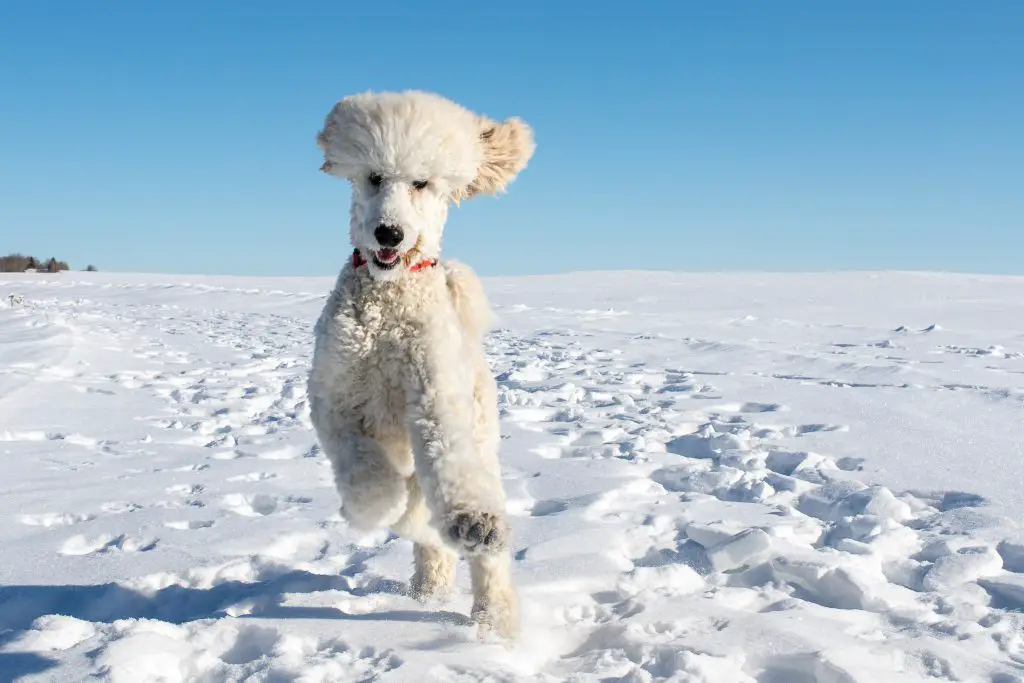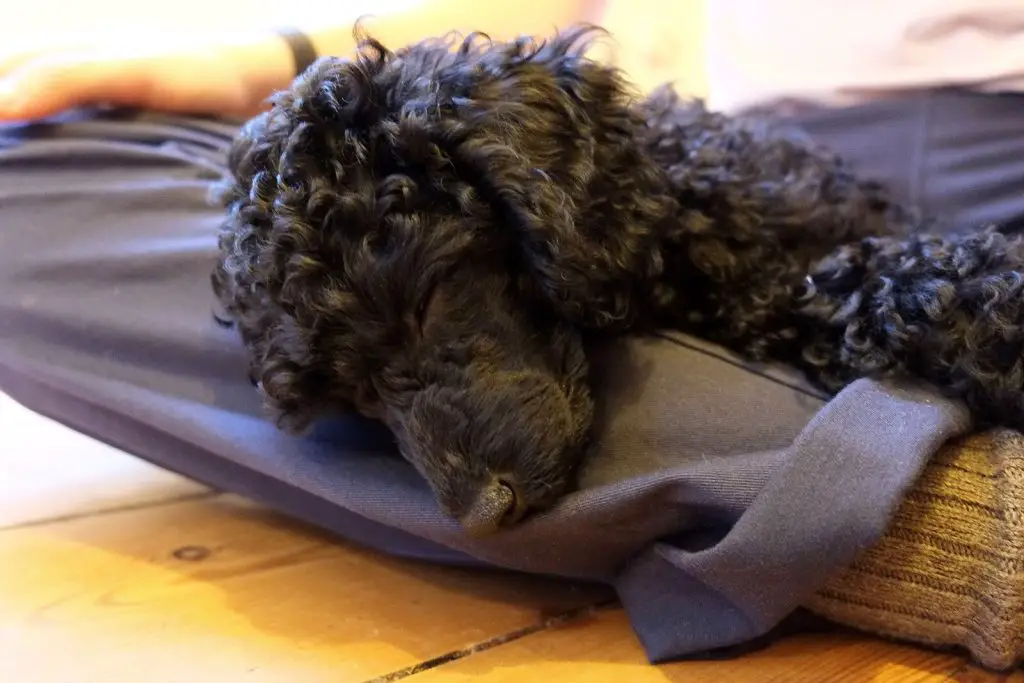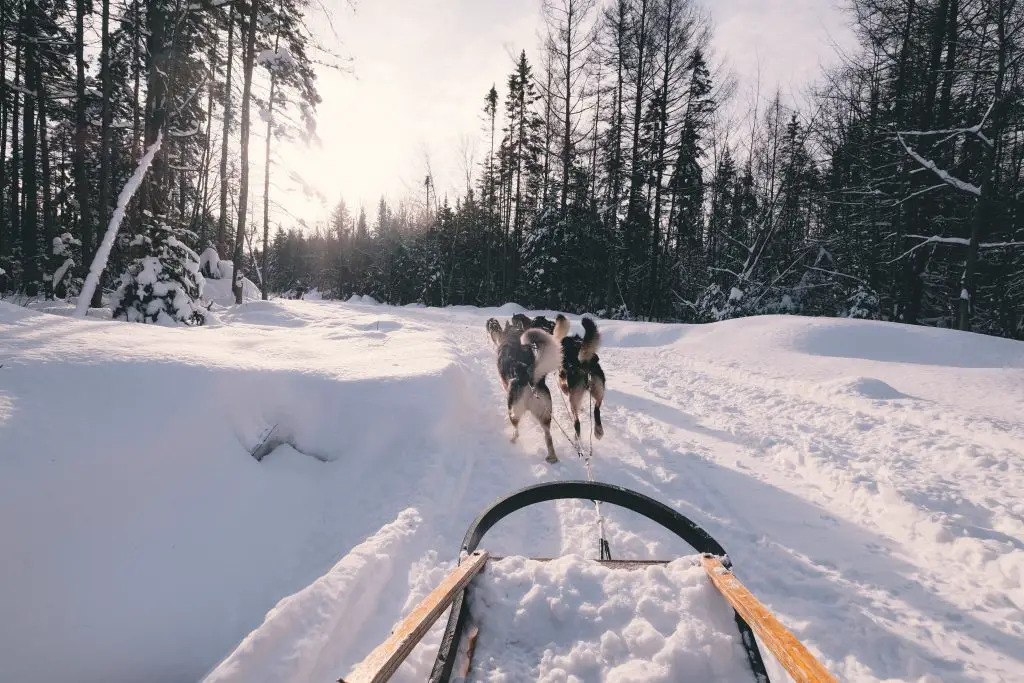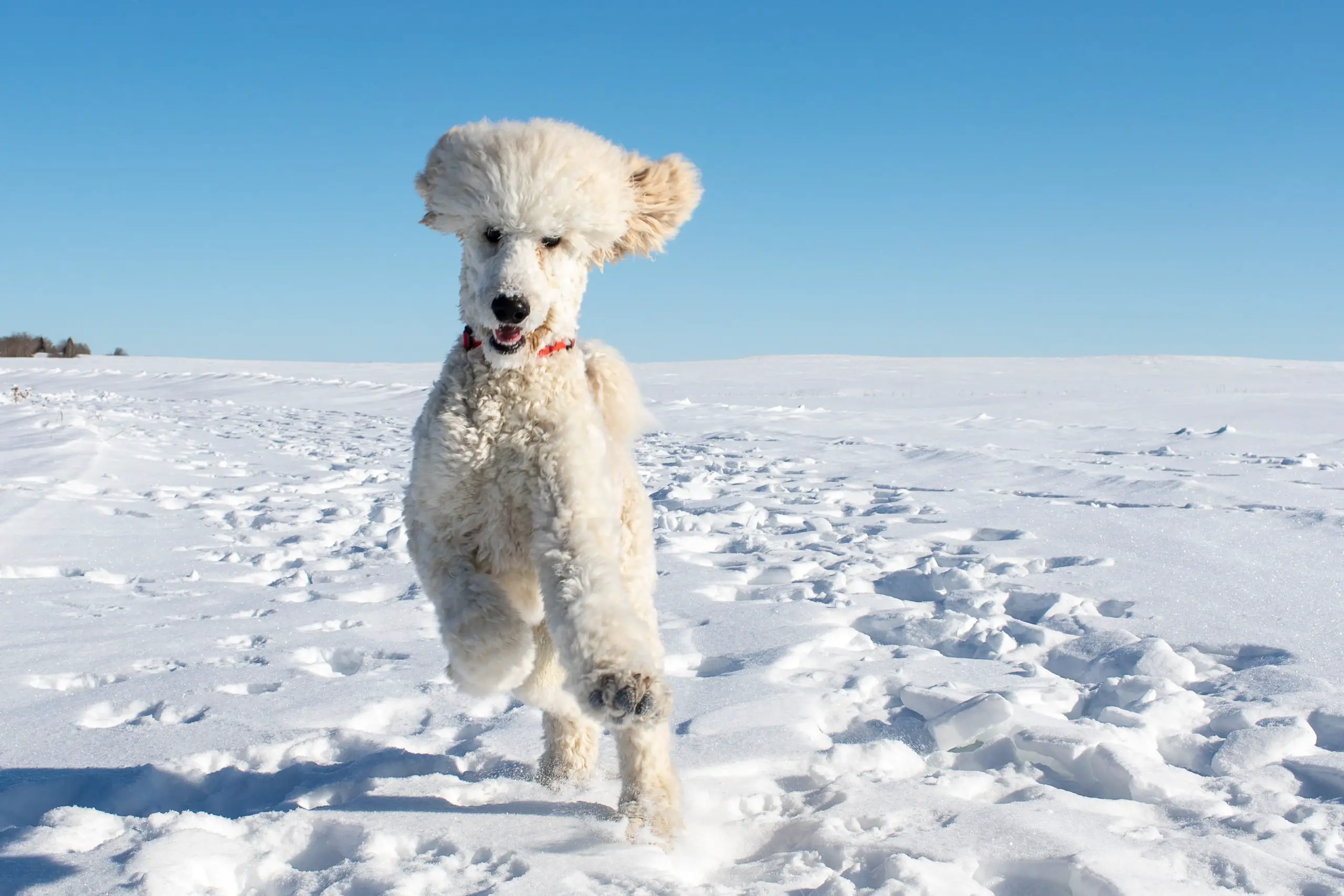Are Poodles Working Dogs? 6 Amazing Jobs Done by Poodles…

Yes. Poodles were bred to be working dogs and are still used as working dogs today. Poodles have a rich and varied work history, from hunting dogs to service dogs, poodles are great at assisting humans with work and other tasks. However, the American Kennel Club classifies poodles as non-working dogs, despite this history.
Poodles have worked in various positions over the years including as duck and waterfowl hunters, military dogs, circus performers, truffle hunters, sled dogs, service dogs, and emotional support dogs.
Poodles Working as Duck and Waterfowl Hunters
Poodles were specially bred in Germany 500 years ago with the purpose of helping hunters with their duck and waterfowl hunting. Poodles are excellent swimmers, thanks to their webbed feet and their curly coat keeps them warm, making them perfect for spending long amounts of time in the water.
Poodles are also easy to train due to their high intelligence and people-pleasing personality, meaning waterfowl hunters could easily train poodles to follow complex commands. Poodles also have a natural “retriever” personality and a natural instinct to fetch. These personality traits translated well to waterfowl hunting, as poodles were able to use their natural instinct and initiative to help with masters catch whatever birds they were hunting.
You might not think a poodle’s fashionable coat would help in the water either, but a poodle’s fur actually lends itself to spending long amounts of time in cold water. The poodles’ single layer of curly hair is naturally water-resistant, it does not get very heavy in the water and weigh them down when swimming- making it practical as well as pretty!
Poodles are also pretty energetic dogs, so they can keep fetching and swimming for a long time before they are tired, making them perfect for a long day out hunting.
Poodles are still used in hunting today, and recent news reports that Poodles are thought to be as good, if not better than the popular labrador retriever in fetching tasks.
So, if you’re thinking you’d like a dog to help with hunting, why not consider a poodle. Some breeders are even breeding hunting poodles specifically for this purpose.
Poodles Working as Military dogs
Poodles have worked as military dogs and helped serve their king and country throughout history. In France, there was a famous poodle named Moustache who is claimed to have been part of both the French Revolution and Napoleonic war. Moustache was reported to have sounded the alarm that nearby Austrians were planning a surprise attack on his French regiment during the Napoleonic war. As thanks for this, the French army added Moustache to the regiment, and Moustache was awarded the ration of a grenadier. Moustache was hailed a hero after the battle of Austerlitz when he helped save a flag that was being lost. Moustache broke his leg in this battle but was greatly rewarded for his heroic efforts.
Poodles also had a brief career in the US Military. In 1943, poodles were on the of 34 dog breeds classified as war dogs by the American military. While poodles were not sent overseas to war, they were used to help with at home defense. Poodles still make good guard dogs now.
In 1944, the military reduced the number of officially recognized war dogs to 5 and poodles were removed for the list. It is thought the reason poodles were cut from the list, is that for a dog to behave well in war as a command or attack dog they need to only be interested in bonding with their handler or owner and be unfriendly and suspicious of others, which is just not a poodle’s nature. Poodles are friendly sociable dogs, which is not a desirable quality on the battlefield, as rolling over for a tummy rub from the enemy would not go down well.
A poodle’s curly fur is also a downside for fieldwork, as you know it takes regular grooming and trimming. Without regular grooming, a poodle coat will become dirty, matted, and long. It seems likely that grooming was probably not a priority for soldiers protecting their country, making a poodle less favorable in the military.
Poodles Working as Circus Performers

Poodles have worked in circuses as performers in the 19th and 20th centuries. The reason for poodles being a circus’ first choice was that poodles were so clever they could be taught lots of tricks and complicated dance routines. In addition, their coats could be groomed into wild, unusual shapes and dyed impressive colors meaning they were very popular. Poodles could also have their fur groomed to mimic a clown’s pom-poms.
Poodles were taught long elaborate acting and dancing routines, often playing different characters in whatever story the performers wanted to tell. Poodles played horses, were taught to walk on their hind legs, and even trained “sing” (I imagine this sounded more like howling!) for the sake of entertainment. Some of these training methods were probably cruel and it is likely that poodles, along with the majority of circus animals, were mistreated at some point or another.
However, as circuses are no longer as popular as they once were and circuses no longer feature as many animals, poodles are no longer a common sight at a circus performance.
Audiences today expect more and more exciting and dangerous acts when they visit a show, and a poodle in fancy-dress no longer cuts it.
Poodles Working as Service Dogs
Poodles make great service dogs and there are lots of poodles who currently help their owner with day to day tasks. Poodles are especially good for being service dogs to those mental, visual, and hearing impairments. Poodles have the added benefit of being hypoallergenic for most people, meaning those who would benefit from a service dog but are allergic to dogs would be able to have a poodle instead. However, because even the largest Standard Poodle is only considered a medium-size dog, they may not be able to do as much as other larger breeds in terms of mobility support.
Poodles working as service dogs can be trained to do all sorts, including recognizing seizures, diabetic comas, and allergic reactions. Poodles are natural retrievers so can be trained to bring their owners objects on command, and most poodles are easily able to learn up to 200 words or commands.
Poodles are loyal, intelligent, and people-pleasing meaning they make good service dogs. However, service dogs need to undergo rigorous and specially approved training and assessment.
Poodles Working as Emotional Support Dogs

Yes, poodles also work as emotional support dogs and are especially good for those with allergies, thanks to poodles being hypoallergenic to the majority of the population. Emotional support dogs help people by offering comfort and companionship to those who are vulnerable or suffering from emotional or mental health issues. Emotional support dogs don’t need extra training but do need to be gentle, friendly, affectionate, and loyal.
Having an emotional support dog can help people a great deal offering unconditional affection and routine to their daily life.
A possible drawback to poodles as an emotional support dog is that they need quite a lot of exercise, so they may not be suited to those who are less mobile. They also need to be groomed regularly which takes commitment and is expensive if done at a dog groomer.
Poodles Working as Sled Dogs

Poodles have also worked as sled dogs, and from 1989 to 1991 a team of standard poodles completed at the in a dog sled race the Iditarod. This is a long-distance sled race, from Anchorage to Noam held every Spring and is over 1000 miles long!
The team of poodles, owned by John Sunter, even managed to beat 13 teams fo huskies one year. However, in general, Huskies are better at this sport than poodles. While poodles are energetic, strong, and kept warm by their coats, they do not have the same drive to pull as huskies do. Still, this impressive feat is just another example of how the poodle is a hardy, hard-working, durable, and tough dog!


